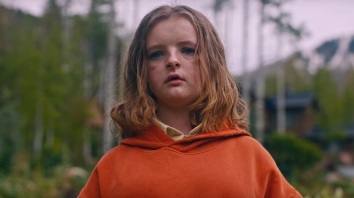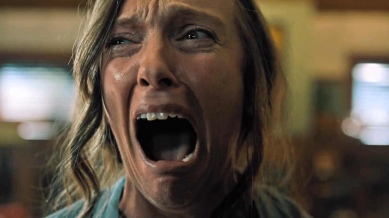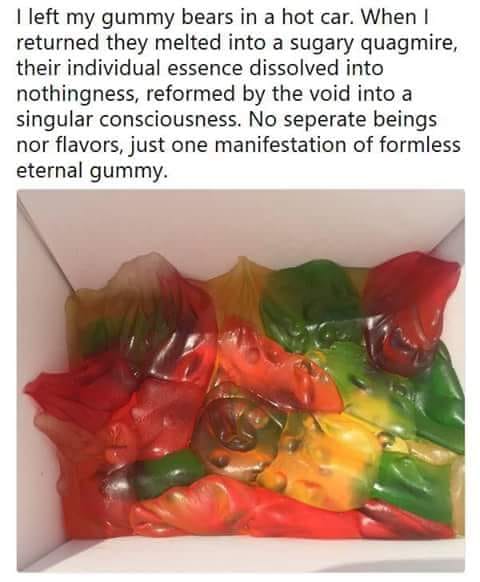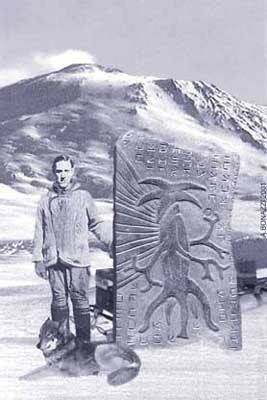The depiction of Paimon in the movie is lame.
Obviously, there’s a lot to interpret in a long, ambitious film like Hereditary. The objective plot, however, is that Grandma and Annie and the Paimon cult are practicing occult rituals to summon Paimon. In a lore book, he’s called a god of mischief and at the end a cult member calls him one of the eight kings of hell. She adds something like, “You’re first form had problems, so we got you a new host.”
I understood that this soliloquy meant to disambiguate some of the film’s content, which I can only imagine is bizarre for people who haven’t read weird fiction. But honestly, it made me laugh because I felt awkward for the director/writer. Let me explain.
Why Paimon’s Depiction in Hereditary Is Lame
Peter throws himself out of the attic window. The blue spirit orb/beam we’ve been shown several times enters him and he rises. When he does, he makes the cluck sound Charlie so often did.
After the soliloquy confirmed what I thought was going on, I thought to myself, Well, clearly the cult failed with this host, too…
Charlie is a great character. She’s intensely creepy and well-played. Speaking of the actress, Molly Shapiro is a lovely young woman in real life. In Hereditary, she is made up to look a bit deformed. Based on the film’s title and her character’s appearance, I wrongly expected the family’s dark secret to involve incest. Her character is also socially awkward and implicitly special needs.

We find out she was the cult’s first attempt at Paimon’s physical manifestation.
Bringing demonic entities into our earthly realm is no easy feat, but the cult of Paimon is off to a bad start.
Then Peter clucks. The woman crowns him and for the first time in a bleak film, the music score turns triumphant, as if the cult of Paimon should feel successful. Again, my inner monologue: that’s it! Two hours and change and the monster clucks and stares off blankly! Toni Collette rendered the performance she did, for this…!
A more ambiguous, subtle interpretation of the end, like maybe the cult will simply have to try a third time (with whom?) to get it right, still disappoints me.
If a hell-king is raised, you damn well better have the payoff be more than a slack-jawed cluck.
Hollywood Marketed Hereditary Wrong
The heart of why Hereditary underwhelmed me is that the film felt so damn indulgent. You can read director Ari Aster discussing Hereditary here. Hearing him, it’s clear the talented man gets his jollies from painstaking displays of uber-artsy critic-baiting.
The blame starts with the suits in Hollywood who allowed this experience to be marketed as a summer blockbuster mainstream horror movie. The hype for Hereditary clogged horror blogs and my social feeds for eight months before it’s release. The trailer pegged it for high quality, slow burning, not reliant on jump scares. This is all true. But what they totally ignored is the weird factor.
I happen to read Cosmic Horror, so I enjoyed seeing the scriptwriters and director try to bring it to life on screen. But it was just too damn weird for America. I think the film should’ve been marketed and released as an indie film. For fuck’s sake, Hereditary screams indie and experimental!
The trailer and hype–especially the comparisons to audiences experiencing The Excorcist–set up an all too mainstream expectation of what this film would be. It was a character study, a family drama, a witchcraft, a haunted house, and a monster film. That’s too busy for Hollywood.
The Cinematography Creates Dread But Runs Long
The cinematography in Hereditary felt masturbatory. To Aster’s credit, I think from beginning to end the sense of dread he accomplishes in the film’s atmosphere is remarkable. While I’ll argue that ultimately his long shots and creepy silent fills hurt the film, I can appreciate good film-making when I see it.
The subtle build-up of tension, disquietude, and genuine dread are, in my opinion, the strongest parts of the film. The reason this serves the film poorly is that it leaves the audience feeling that the 2:07:00 run-time is unjustified at best, maddening at worst.
The Family Drama Focus Tested My Patience
Another element that works against the film, considering once again its marketing as a summer horror blockbuster, is the weight given to the family drama. If I’d been in the mindset for an indie horror experience it might have bothered me less. For the most part, Ari Aster does an excellent job of giving the characters depth. However, I think he specifically gives the Annie-Peter relationship so much weight that it tips the balance of the film.
The middle of the film loses momentum briefly when we’re given a ten or fifteen minute sequence where Peter has a panic attack at school, Annie delivers her heartbreaking confession of rage to Peter at the dinner scene, and then she has a sleepwalking nightmare in which ants kill Peter.
Stuffed in here, we learn about how Annie tried to abort Peter “any way she could think of,” and that she’s had issues with sleep-walking in the past. This includes a horrific scenario where Annie, Peter, and Charlie wake up drenched in lighter fluid, Annie about to strike a match.

Frankly, if the characters were stuffed animals, this is when overstuffing would burst the seams. Annie’s damage is obvious enough from what she tells the Lost Loved Ones support group. The audience needs to know Annie almost set herself and two children on fire. I think this could’ve been done with economy. Instead, it’s tossed in with a maelstrom of other elements in the film.
Where I Lost Trust In Hereditary
The Peter-Annie stuff occurs at least an hour and a half in, about the time when most moviegoers–perhaps expecting a more mainstream experience–get antsy. I did.
Right after the Peter/Ant nightmare, I got sucked out of the movie.
I remembered back to the good (but obvious) plant of Annie finding her mother’s book in the box with a note in it discussing the family’s sacrifice “being worth it.” I thought to myself, Enough character development with Annie and Peter! Is the witchcraft angle even going to pay off? Get to it!
Admittedly, the film answers my request immediately. Annie literally returns to the box and off we go. But, alas, my central point, which is that Hereditary asks too much of its audience’s patience.
I lost trust in the film, trust that a satisfying conclusion was on the way.
Hereditary Demands its Audience Get Over Three Main Humps
- indulgent filler cinematography
- overdone family drama conventions
- the unbalanced structure (the witchcraft “stuff” paying off so late)
It feels odd writing such a seemingly negative review of the movie. Because I honestly did like it. I just think the story is disappointing in film form. I suspect that the “what the fuck did I just watch” reactions I’ve seen people having to the film aren’t said in the good way, marveling at Ari Aster’s cleverness.
To be super frank, I don’t think the ending is hard to figure out, I think it’s hard to care about. I talked about the anticlimactic presentation of Paimon earlier. Alex Wolff, who plays Peter, said this on the topic:
“[Charlie] is a demon. But I feel like it’s so interesting – Ari took the approach that she’s not necessarily evil. She’s actually scared, and she’s just in this circumstance. She’s born this way, and she doesn’t feel connected to the rest of the world. And I think it’s kind of a sick, twisted, true analogy about being on the outside and having a mental disorder.”
This isn’t satisfying to a movie audience. The reason (remember the marketing!) is that we didn’t pay $12 to watch a subtle, cinema verite on emo hell-kings.
Thus, the title of this review.
Hereditary, a fine story, should not have been a film but a novel.
Anyone who reads horror fiction, really in any sub-genre that would apply to this film, can agree that the intellectual exercise the story calls for can be enjoyed and explored with even more depth, and have its thought-provoking anticlimax, in a 450-page novel.
I argue that, much like Charlie and Peter are faulty hosts for Paimon, perhaps the form of novel would’ve been the right flesh for Hereditary to inhabit.
What do you think?
There’s a lot to unpack in Hereditary, and I’m dying to have a conversation about it. Comment to let me know what you think! Am I right that it would be more effective as a novel?




